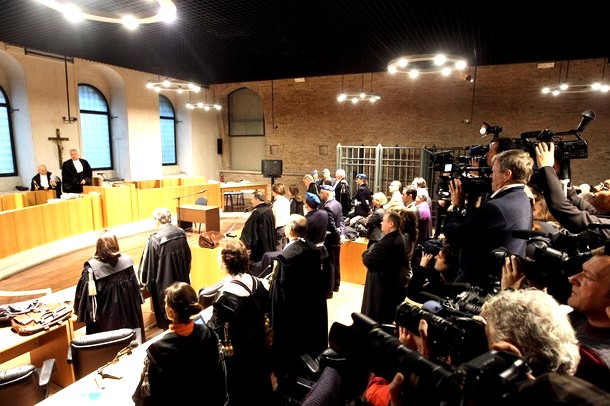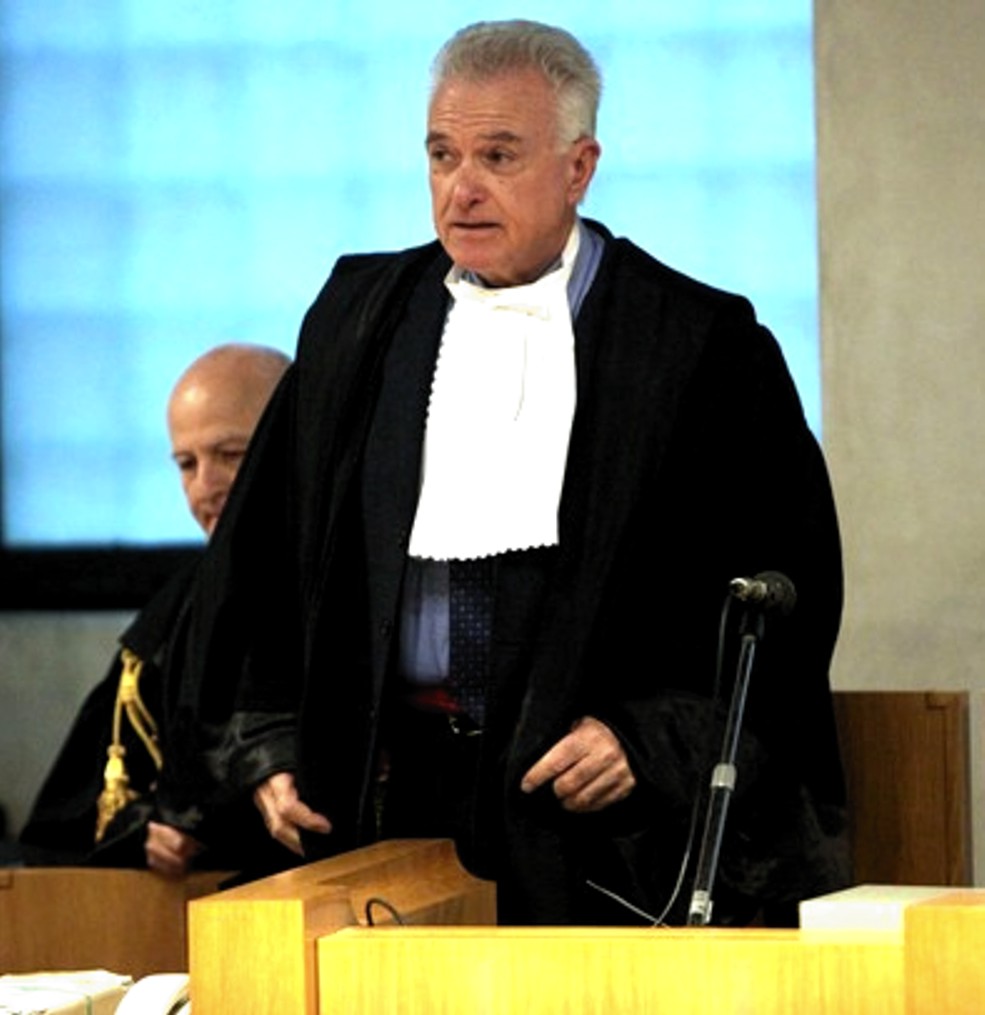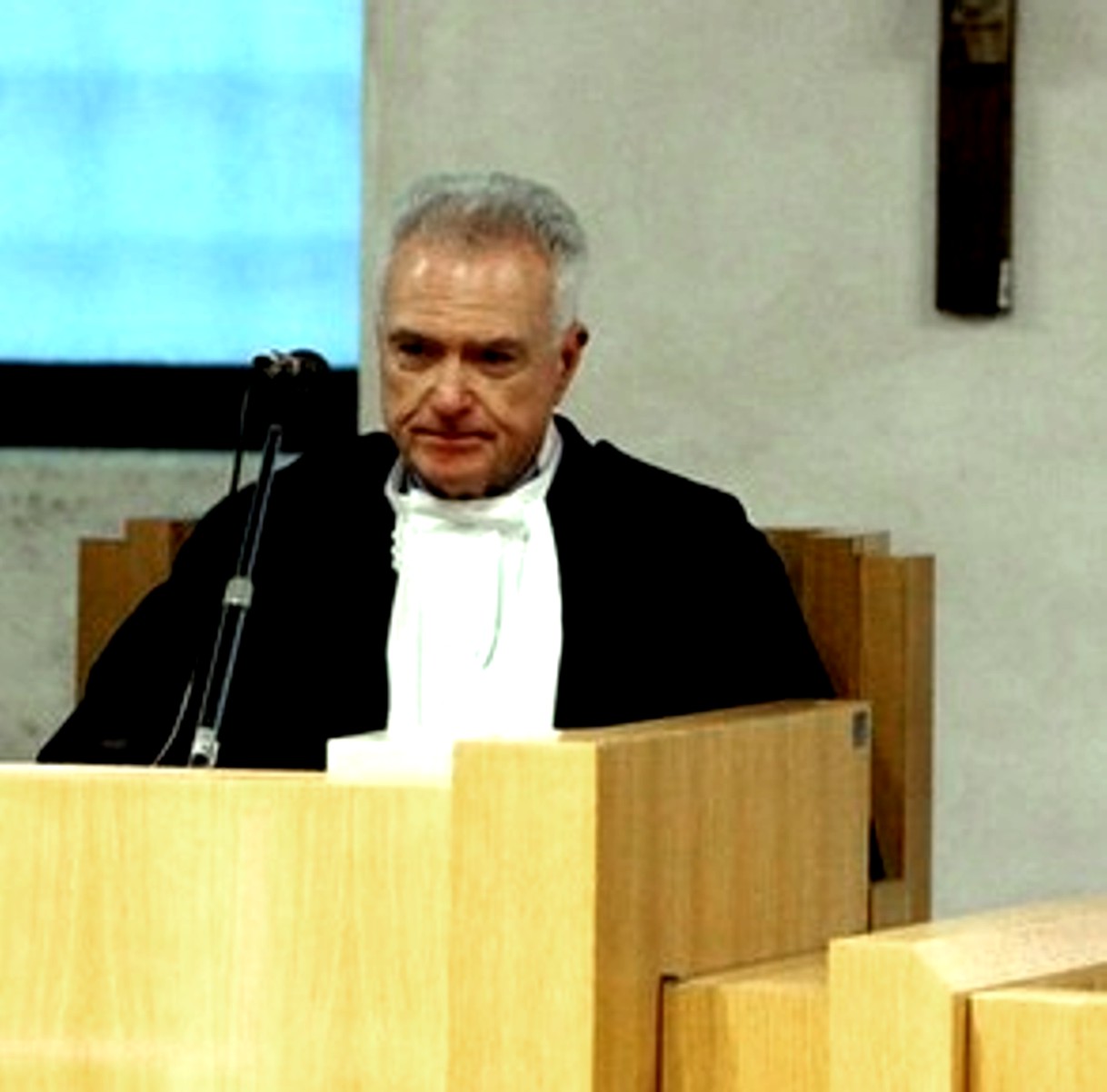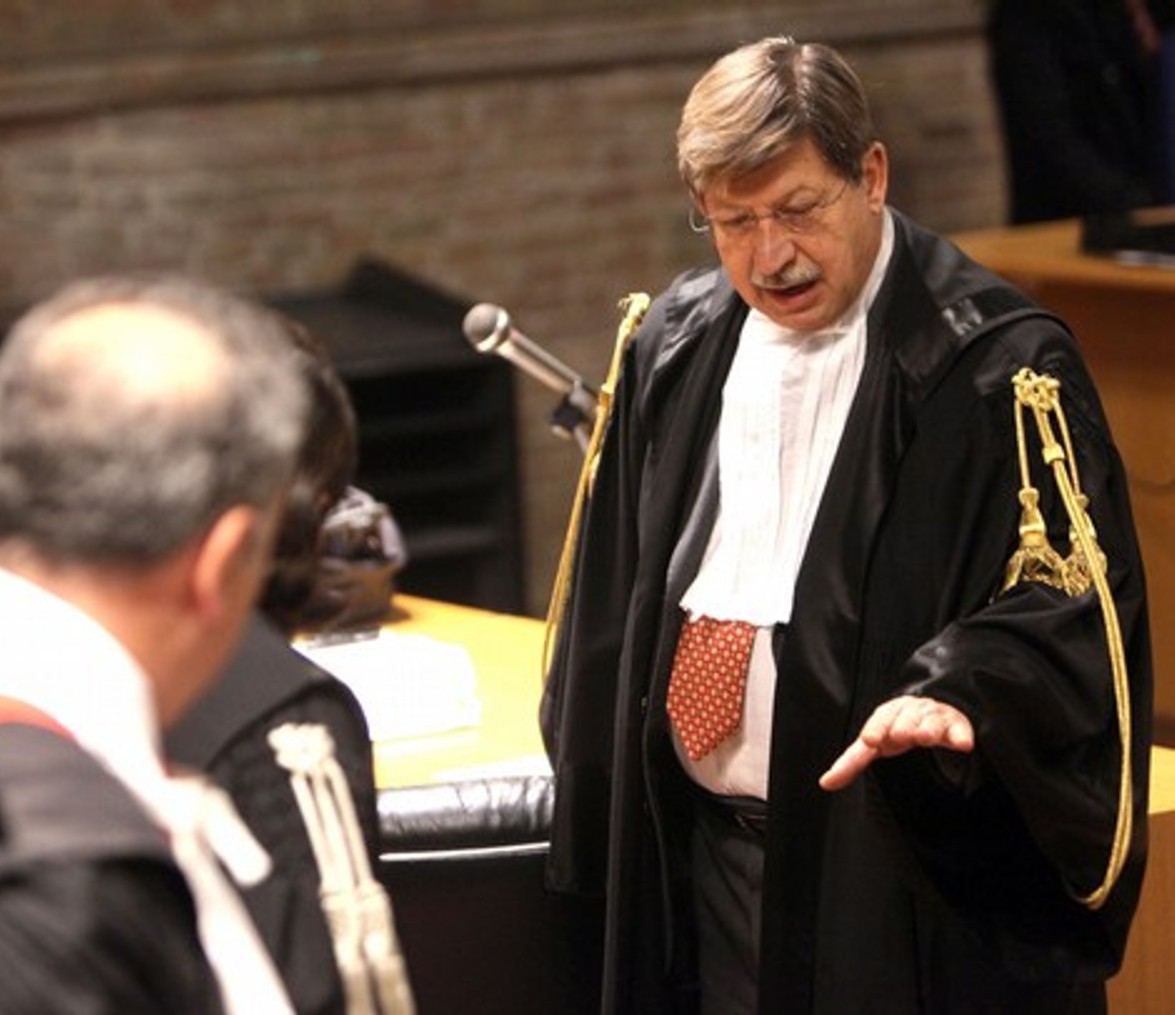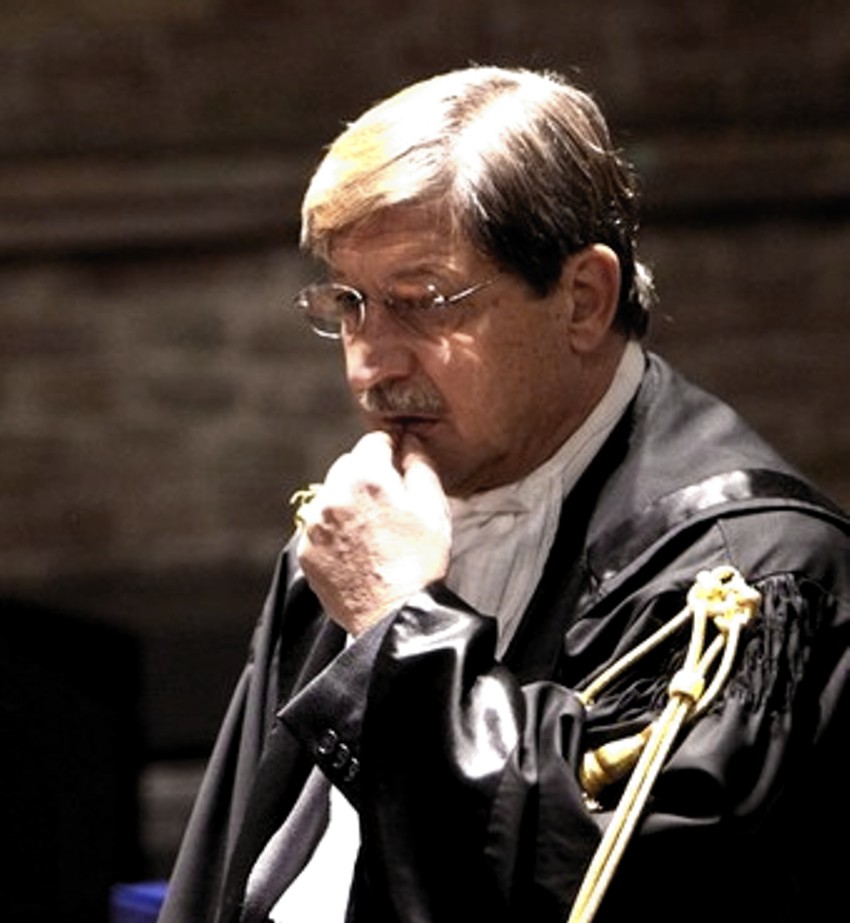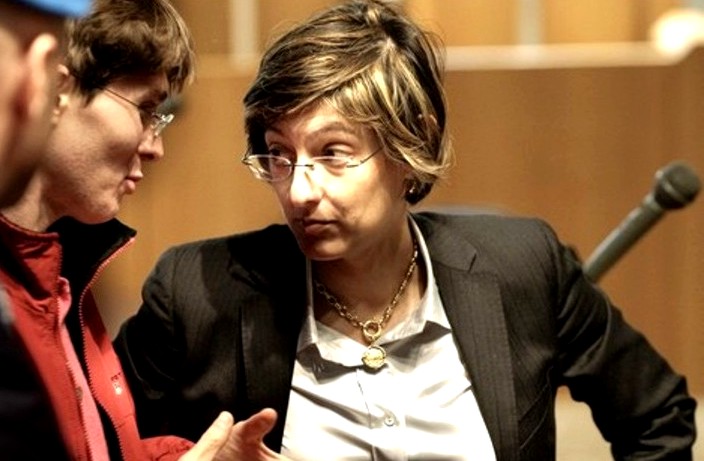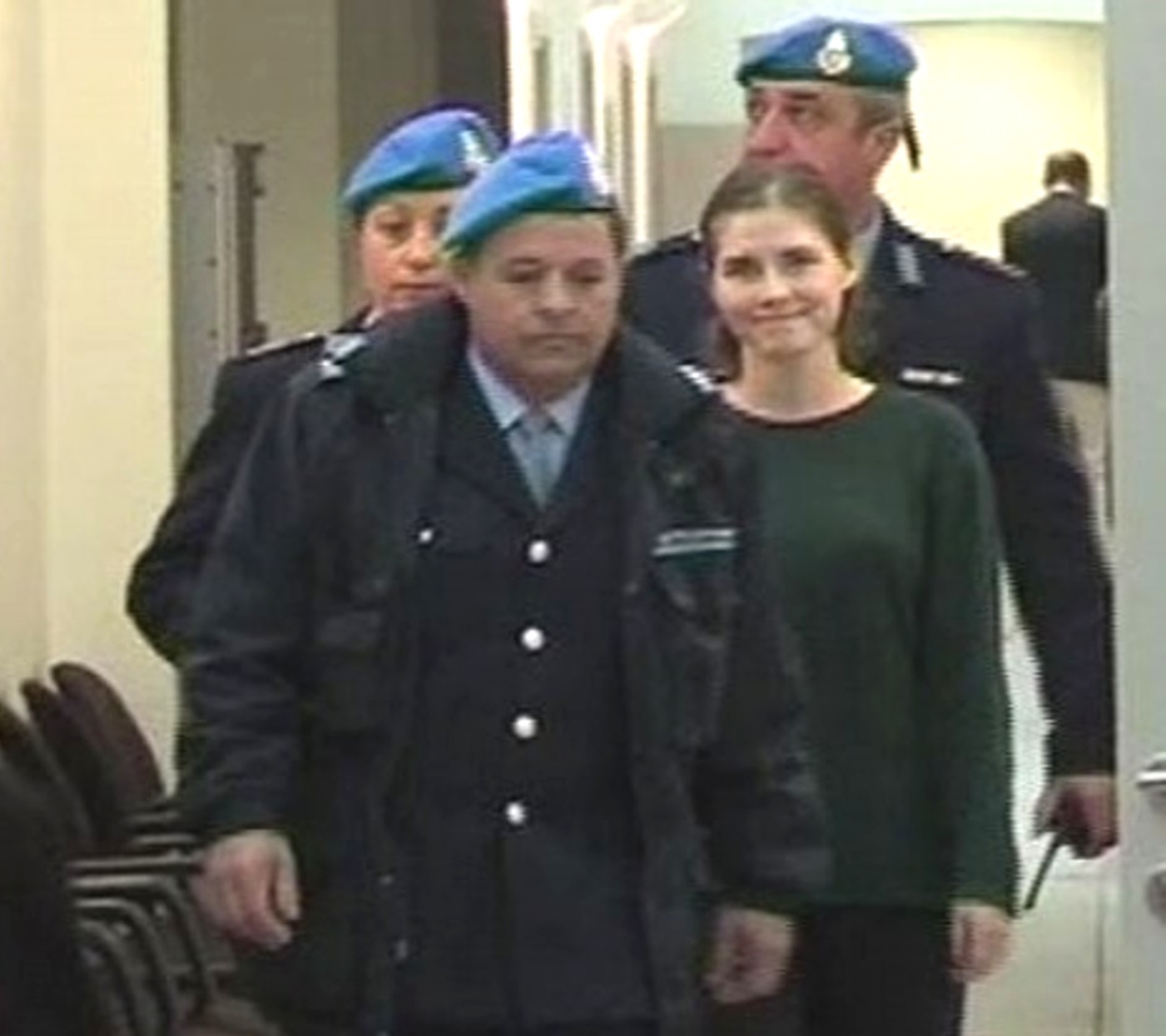
Category: Hellmann 2011+
Wednesday, November 24, 2010
1st Appeal Session: A Roundup Post On Points of Significance In The Italian, UK And US Reporting
Posted by Peter Quennell
The full cycle of court session reporting usually takes quite a few hours, so new items will be added periodically at the bottom of this post.
1) Andrea Vogt in the Seattle Post Intelligencer on the court dates.
Presiding judge Claudio Pratillo Hellman (with assistant judge Massimo Zanetti) swore in the jury of five women and one man, then promptly made his first decision: hearings just once a week—on Saturdays—to accommodate Sollecito’s high profile attorney Giulia Bongiorno (a key Italian parliamentarian and head of the justice commission who recently revealed she is several months pregnant).
Lead Prosecutor Giancarlo Costagliola noted it was out of the ordinary to build a trial around one lawyer’s personal and political engagements, adding that while everyone wants Bongiorno’s pregnancy to go forward regularly, “we must also ensure the trial goes forward regularly.”
But the judge said in order to start the trial “in a serene atmosphere,” he would grant the request, and fixed hearing dates for Dec. 11, 18 and Jan. 15….
2) Andrea Vogt in the Seattle Post Intelligencer on the defense strategy for the appeal.
Knox’s appeal is built largely around a request for an independent review of forensic evidence (in particular the DNA evidence from the knife that prosecutors say was the murder weapon)...
The appeal also cites a lack of motive,and a series of inconsistencies in witness testimony. Put together, that lawyers say, the arguments establish reasonable doubt.
In particular, the appeal introduces new questions about the reliability of testimony of Antonio Curatolo, a homeless man who placed Knox and Sollecito near the scene of the crime the night of the murder.
Sollecito’s appeal also includes an evidentiary review (in particular of the DNA found on the victim’s bra clasp) but also aims to introduce new evidence, such as pillow stains not tested by forensic police, and expert testimony about Sollecito’s computer mouse, whichlawyers say proves he was home when prosecutors claim he was at the murder scene.
3) Andrea Vogt in the Seattle Post Intelligencer on the outcome possibilities.
Prosecutors are also appealing the extenuating circumstances granted to Knox and Sollecito, in hopes that they’ll be handed down a life sentence.
Under Italian law, anything can happen in the appeals process, from complete acquittal, to conviction on lesser charge such as manslaughter, to an even harsher sentence if convicted again.
4) Andrea Vogt in the Seattle Post Intelligencer on changes to Knox’s mood and PR strategy.
Knox did not appear the same carefree Seattle girl who in her first public court statement giggled as she explained that her rampant rabbit vibrator was just a joke, or who would often turn to smile and wave at friends and family during courtroom breaks.
Three years in the Capanne penitentiary have taken their toll—the gravity of her situation has set in, and recent months have been particularly fraught with tension and worry.
“She feels the weight of all of this on her shoulders,” Ghirga said. “She has lost some faith.”
Her family’s approach has also changed. In sharp contrast to the criticisms directed at the Italian judiciary during her first trial, Knox’s stepfather Chris Mellas, told reporters outside the courthouse that the family had “full faith in the Italian justice system,” adding that “after all, Italy’s judiciary has a long and rich history.”
“Amanda is happy to finally get this process going, we have a new jury and new judges. Unfortunately we have the old prosecutor, but you can’t have everything.”
Yet that most controversial figure, prosecutor Giuliano Mignini, was not even present in court. Only co-prosecutor Manuela Comodi donned the black robe to help lead prosecutor Giancarlo Costagliola.
[Below: Broadcast media equipment outside the court last night mixed in with the seasonal funfair in the piazza]
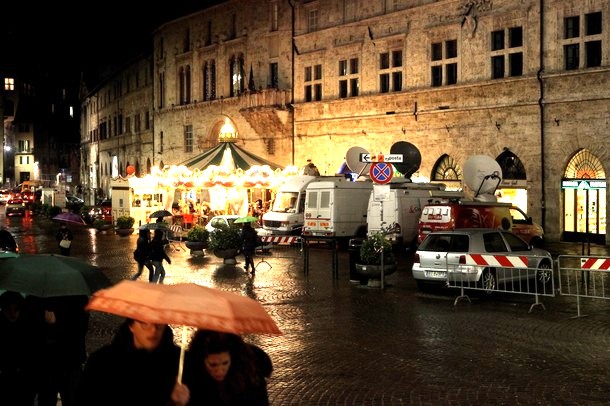
1st Appeal Session: Kercher Lawyer Maresca Says Verdict Perfect, Seems Optimistic This Soon Over
Posted by Peter Quennell
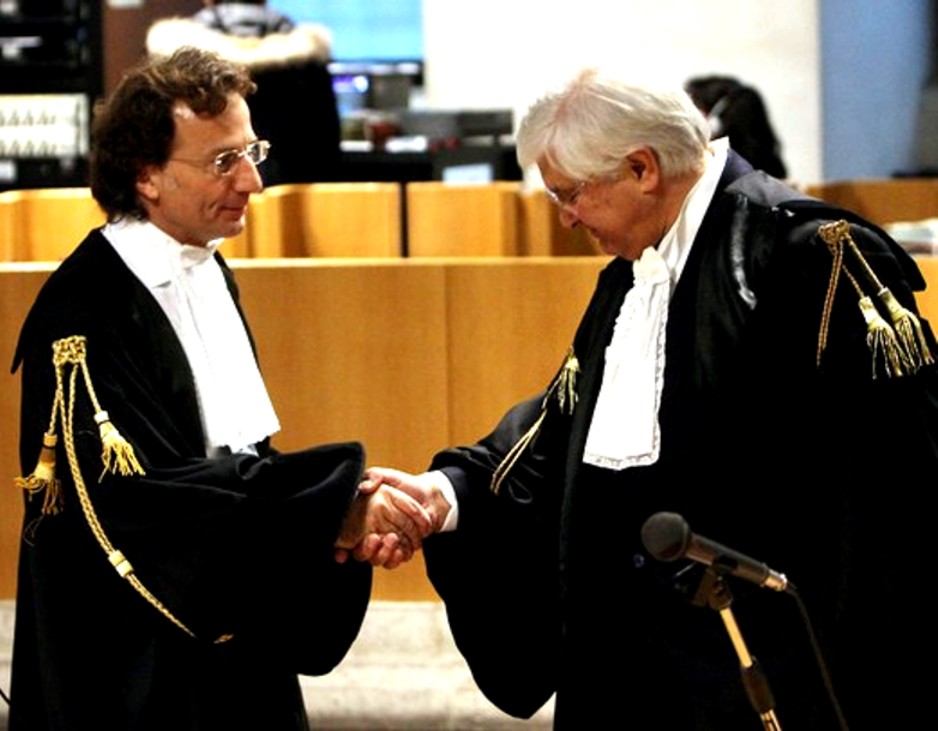
[Above: Kercher family lawyer Maresca with Knox defense lawyer Ghirga]
Dario Thuburn of the AFP reports remarks by Kercher family lawyer Francesco Maresca and Meredith’s father John.
A lawyer for Kercher’s family, Francesco Maresca, said the original sentence against Knox was “perfect” and said he would “call for justice again.”
He said the Kercher family is eager “to close this chapter.”...
Kercher’s father, John, meanwhile sent a letter to the mayor of Perugia through his lawyers to thank local authorities for setting up a scholarship in her name at the university where she was on an exchange programme.
“Meredith loved Perugia and had made a lot of friends there,” John Kercher wrote, adding that the family was “moved” by the scholarship decision.
Also included in Dario Thuburn’s report on today’s short session:
A nervous-looking Amanda Knox began her appeal on Wednesday against her conviction for the gruesome sex-murder of a British student in the medieval Italian city of Perugia in 2007….
“We feel as though we have a very good case,” her step-father, Chris Mellas, told AFP ahead of the hearing. “She’s going to go home,” said Mellas, who has been living in Perugia since September to help Knox prepare for her appeal….
Wednesday’s hearing lasted only a few minutes and the appeal court judge scheduled the next hearings for December 11, December 18 and January 15…
[Knox defense lawyer] Ghirga said the defence would focus on DNA evidence linking Knox to the crime scene that he said had been questioned by three scientific opinions. The lawyer said Knox’s mother and father would be at the hearing on December 11 and said he expected the trial to conclude in February or March.
Asked about her health, he said: “She looks terrible. She’s very thin.”.. Prosecutors have said they will seek a life sentence for Knox—their original request in her first trial—if the conviction is upheld.
Note what Mr Ghirga said about the appeal maybe being over in February or March. The judge decided on sessions only once a week (Saturdays to suit the pregnant lawyer Giulia Bongiorno) which suggests it’s all over in 10 sessions or less.
We believe the only way it can conclude as soon as that is if all or most of the requested DNA re-testing and new witnesses are refused. DNA re-testing alone could take months.
That makes the 11 December appeal session into quite a cliffhanger.
We can see no overwhelming reason yet for the verdicts to be overturned, and if there is going to be one it can only come from that retesting and any new witnesses if allowed.
1st Appeal Session: Appellant Amanda Knox Arrives In Appeals Court
Posted by Peter Quennell
1st Appeal Session: Appellant Raffaele Sollecito Arrives In Appeals Court
Posted by Peter Quennell
1st Appeal Session: Judge Claudio Pratillo Hellmann And Prosecutor Giancarlo Costagliola
Posted by Peter Quennell
Thursday, November 18, 2010
First Appeal Hearing Next Wednesday In Suggestive Absence Of Sollecito Lead Lawyer Giulia Bongiorno
Posted by Peter Quennell
The first appeal hearing next Wednesday 24 November will be technical or procedural.
The hearing to be presided over by by Appeals Judge Claudio Pratillo Hellman will cover the lawyers’ motions on evidence and witnesses.
If at the next hearing on 11 December those requests are disallowed (all of the Guede team’s requests during Guede’s appeal last December were disallowed) this level of appeal for Knox and Sollecito might be over within two months if we assume two hearings a week. .
Appeal Prosecutor Giancarlo Costagliola will be joined by main-trial prosecutors Manuela Comodi and Giuliano Mignini. This was a judge’s decision, and not Ms Comodi’s or Mr Mignini’s, and it was to ensure that many months would not be wasted mastering the complexities of the Massei Report and the further many thousands of pages of documents that make up the case.
The defence teams will consist of Giulia Bongiorno, Luca Maori and Donatella Donati for Raffaele Sollecito, and Luciano Ghirga, Carlo Della Vedova and Maria del Grosso for Amanda Knox. Ms Bongiorno is five months pregnant, and she has said that it is for this reason that she will not appear in court next wednesday.
Is this move a sign of something more to come?
During the trial last year, the prosecution hardly missed a beat and the pace was relentless. When it came time for the defense phase, it was slow and hesitant, some court days were canceled, and some of the defense presentation seemed decidely ad hoc.
Once last year Ms Bongiorno disappeared for weeks on end, ostensibly on parliamentary business, and later in the year she developed an attack of appendicitis at a key moment. That threw into question whether she would handle the end-of-trial defense summation - at the last moment, some part of it she did
She presumably isn’t liking this case very much. Her attempt amidst much publicity to have someone actually simulate Guede’s supposed climb through Filomena’s bedroom window was a total ignominious failure. And we have heard that the Sollecito family and defense team despise the Knox entourage and PR scheme with its incessant sliming of the Italian justice system and its main players in this case, which has done them nothing but harm.
Raffele Sollecito himself has still not provided Amanda Knox with a full alibi for the night (his last word was that she was out for four hours) and on the whole seems to show signs of pulling way from her rather than of associating himself with her any closer. They talked by phone a few days ago but the call was officially monitored and so we presume nothing significant was said.
The Knox defense might complain about no videotape or recording of Knox fingering Patrick, for which she was awarded an extra year in prison. But the unscheduled WITNESS interrogation of Knox did not require a recording - witnesses by the thousand are questioned by police daily all over the world (watch any crime show on TV) without a video recording being made.
Maybe it is just as well for Knox as she seemingly cracked because Sollecito made her crack - by calling her a liar in the next room, over their first alibi, and changing his own. Better not to have recorded that…
The mitigating factors that Judge Massei accepted that are being appealed against by the prosecution include whether Knox demonstrated some remorse by placing the duvet over Meredith after the attack - meanwhile apparently removing her cell phones and locking the door some minutes before Meredith finally succumbed.
They also include whether Knox instigated the attack on Meredith. Judge Massei concluded that Guede instigated it, but Mignini had argued that there was a payback element to the attack, which may have entered their minds the previous day (those AK messages to Meredith) or that same fateful night (Patrick’s message saying no need to come to work, one interpretation being that Amanda was on the point of being fired.)
On the demand for some retesting of the DNA, it is worth recalling that the defense experts were expected to attend the one time only testing of the DNA on the knife - but on that day despite weeks of advance notice they found “good” reason to be elsewhere.
On the demand for retesting of Sollecito’s DNA on the bra clasp, it was pressed in hard and there is zero sign that any contamination had taken place - here again. the defense played a seeming trick. The Rome labs realised within hours of their first crime scene search that the bra clasp was still back in Meredith’s room, and weeks went by before the investigators and representatives of the defense could all be there to collect it.
The many contradictory albis, the various witnesses, the luminol evidence, the post-attack behaviors, the possibilities of both Raffaele Sollecito and Rudy Guede at his second appeal, which is in December, turning into wild cards?? Not a pretty sight for Amanda Knox’s defense.
Can they get pregnant too? No doubt they wish that they could.
Monday, November 08, 2010
Another In Seeming Never-Ending Disasters For Hapless Knox Campaign
Posted by Peter Quennell
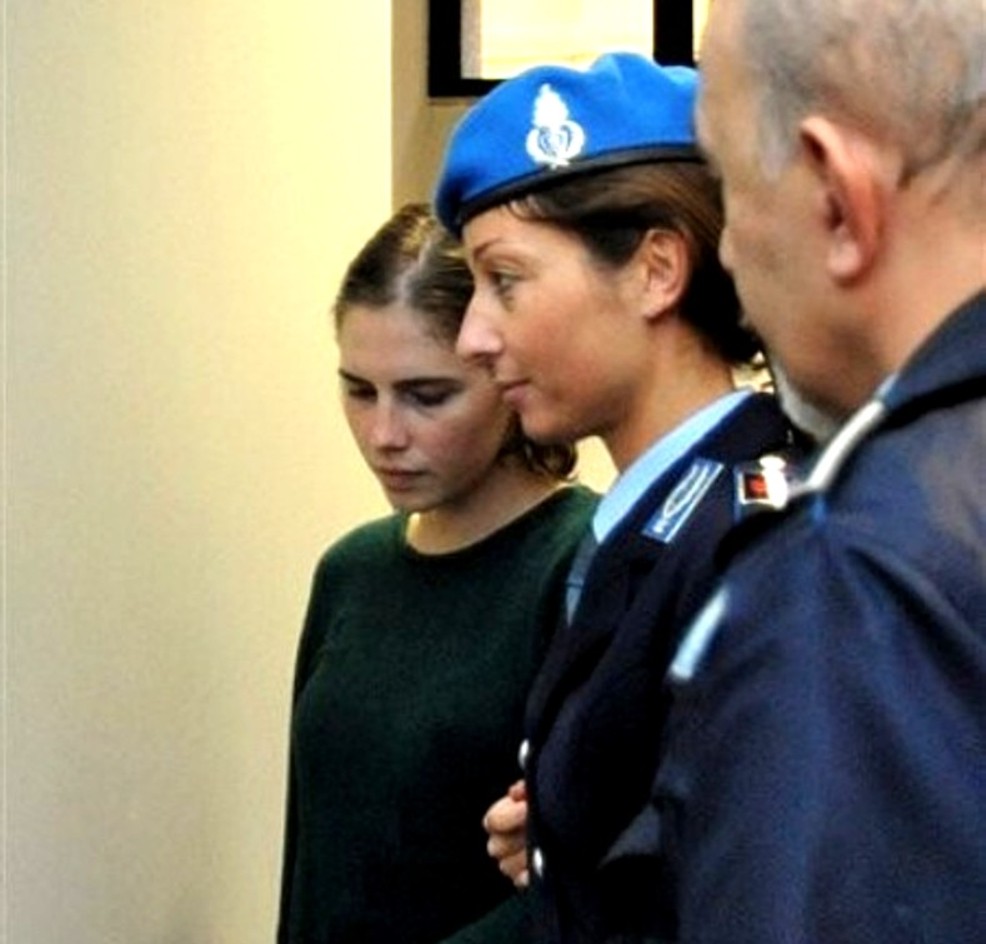
Apparently xenophobia and sliming and serial misconstruing of the evidence isnt working. The Italian authorities continue to be relentless and unblinking.
In court today, Amanda Knox was indicted by the judge and she WILL stand full trial next May for calunnia. This first report on the BBC News website as follows.
American student Amanda Knox is to face trial for slander after saying police beat her during questioning over the killing of Briton Meredith Kercher.
A judge made the decision at a closed indictment hearing in Perugia, Italy.
Knox, 23, told the judge she never intended slander and was just trying to defend herself, her lawyer said.
Ann Wise of ABC News adds this.
American student Amanda Knox was indicted for a second time by an Italian court today, this time for allegedly slandering Italian police for saying they were abusive when they interrogated her for the murder of her roommate.
Knox, who was convicted last year of murdering Meredith Kercher and sentenced to 26 years in prison, stood up in court and made what Italian legal officials call a “spontaneous statement” before the judge’s ruling.
“I have always tried to defend myself. I never wanted to offend or slander anyone,” Knox said in Italian.
Nevertheless, preliminary hearing Judge Claudia Matteini indicted Knox, 23, for slander.
The charge refers to Knox’s testimony during her murder trial that Italian police were rough with her when they interrogated her overnight just days after Kercher’s body was found in a pool of blood in the house they shared.
She claimed the officers yelled at her, discouraged her from calling a lawyer and cuffed the back of her head. The 12 officers named in the slander complaint have denied being abusive to Knox.
At the end of the long interrogation, Knox signed a statement in which she said she had a confused dream-like recollection of being in the house and hearing Kercher scream, effectively placing her on the scene of the crime.
Knox’s lawyer Carlo Dalla Vedova said Knox was “saddened” by the decision.
Another lawyer for Knox, Maria Del Grosso, told reporters that “for Amanda this (interrogation) was the genesis for her homicide accusation. She is very frustrated and obviously disappointed, but she knows that today’s was only a preliminary hearing and the truth was not ascertained today. Let’s hope it is when the case is debated because there was something that went wrong that night.”
Knox was driven into the courthouse in a police van with darkened windows. The hearing was closed to the public, but photographers were able to get a glimpse of her in the courtroom hallways. Looking thinner and drawn, Knox wore a dark green sweater and black pants, her hair is a jaw-length bob.
Before the hearing, Knox’s stepfather Chris Mellas told ABC News that “Amanda is doing better. She is rightfully angry about the slander accusations, and told me she was going to speak out in court this morning. She told me she wanted to tell them that she sees police interrogations shown on TV all the time, and would like to know why her interrogation was not recorded or videotaped.”
But according to her lawyers, she limited her statement to saying she was just defending herself and did not want to offend.
Knox will go to trial for slander on May 17, 2011 before a single judge, Cecilia Bellucci. Matteini said the case needed to go to trial to resolve some formal technical matters, and to debate the accusations, possibly with witnesses.
The lawyer for eight of the police officers, Francesco Maresca, said that the “framework of the request for an indictment was confirmed, and now we await the debate.”
Conviction of the charge could add as much as six years to Knox’s prison sentence.
Again, this is the nexus of Amanda Knox’s accusation against poor Patrick Lumumba who spent two terrifying weeks in Capanne Prison and later lost his business when the customers fled.
Whatever else she may be, Knox does seem to be a serial blamer of others. Blaming the cops for her blaming Patrick, Knox seemed to us to think, was an easy way out.
Italian reports say that she seemed to be scowling or sour or very serious or depressed (no mention of nervousness) and that she had put on a few pounds.
Sunday, October 31, 2010
Corruption Of Appeal: Angry Top Criminal Judge Chiari Is Blatantly Forced Aside
Posted by Peter Quennell

Umbria’s top criminal judge Sergio Matteini Chiari
Very Dirty Business
Only one month ago Umbria’s top criminal judge Sergio Matteini Chiari was to preside.
Now a very angry Judge Chiari has been forced aside with no public explanation from Chief Judge De Nunzio [image below] as to why.
A wildly wrongly qualified judge, Hellmann, a business judge with just two criminal trials in his past, both fiascos, mysteriously takes his place.
Rumors of foul play are appearing in the Italian media. Has Chief Judge De Nunzio been leaned upon politically? Do big bucks or rogue masons have any role in this?
Please click here for more
Friday, October 29, 2010
Kercher Family Lawyer Francesco Maresca Confident Appeals Will Fail And Justice Will Prevail
Posted by Peter Quennell
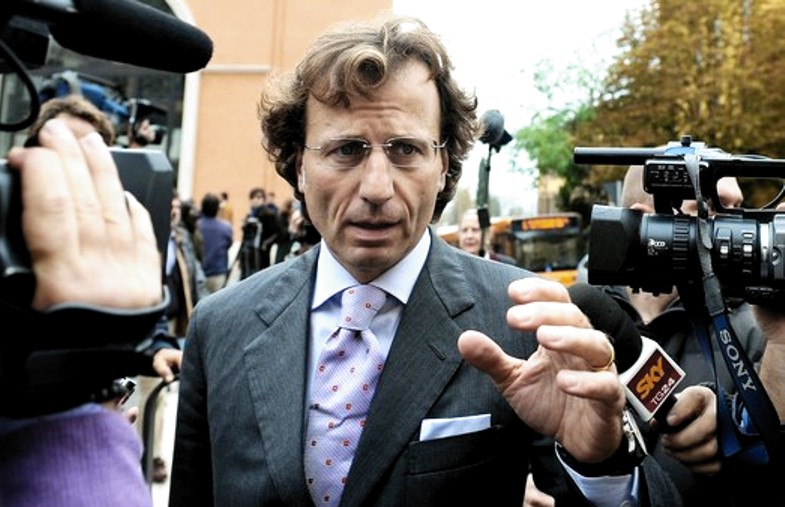
This excellent interview of Mr Maresca by Leonardo Molinelli just appeared in Canada Corriere.
The interview is similar to several others Mr Maresca has just given in Italy. Mr Maresca shows in all of them that he is very confident about the defense appeals not succeeding in any dramatic way.
Justice will be served in Kercher case
“The investigation was carried out very well”: lawyer
By Leonardo N. Molinelli
There’s less than a month to go to the start of the appeal process for the murder of 20-year-old American student Meredith Kercher. The next phase will begin on Nov. 24, which should establish the guilty parties in the death of Kercher, who was killed in Perugia, Italy between Nov. 1 and 2 of 2007.
Charged with first-degree murder, sexual assault, and theft is 26-year-old Amanda Knox and 23-year-old Raffaele Sollecito with whom Knox was having a relationship.
The other person facing charges ““ Rudy Guede from the Ivory Coast ““ will not be part of the process since he has already been condemned to 30 years [reduced to 16 at first appeal] at a summary procedure. He will face the Court of Cassation (appeals) for final sentencing [in December].
All three of the accused have always declared their innocence and the upcoming process promises to be controversial and sensational. The defence for Sollecito and Knox, in fact, has requested access to all forensic investigation from the Court of Cassation.
They’re requesting the analyses of all the principal exhibits, maintaining that the two were not present at the murder scene and thereby placing the blame squarely on Guede.
“The Kercher family has taught the world the dignity of silence.”
With these words, the family’s lawyer Francesco Paolo Maresca outlines the trial that went beyond the usual standards in legal battles in Italy, moving from the courtrooms to TV and newspapers.
Corriere Canadese/Tandem recently spoke to Francesco Paolo Maresca about the trial.
Has there been any new developments since the preliminary sentencing and the appeal?
“No, let’s say that the defence requested the appeals court for a review of all forensic findings, following the defence line in the preliminary trial, in which they contested all the assessments.”
Accusations that were discredited with the preliminary sentencing.
“Yes, so much so that the preliminary sentence is based on all these laboratory results accepted as fully reliable in the presence of the parties, and no one ever contested anything on that basis.”
So what is the defence’s objective in this case?
“They’re requesting, in substance, the detailed analyses of all the main exhibits, therefore the bra hook containing Sollecito’s DNA and the bathroom rug with Sollecito’s footprint.”
Do they intend to demonstrate the non-involvement of the two youths in the murder?
“They’re aiming to demonstrate the total non-involvement, unloading everything onto Rudy Guede.”
So Guede would have killed Meredith by himself while Amanda and Raffaele were in the wrong place at the wrong time?
“Actually, they say they were at Sollecito’s house after having smoked hash, made love, and woken up early the next morning.”
So they would have been connected to the crime scene as part of a conspiracy?
“They got there by coincidence based on test results. They say that the DNA on the bra isn’t Sollecito’s and if it were, it would have been found in other parts of the house, that the footprint on the rug isn’t Sollecito’s), that the DNA on the knife isn’t Knox’s, and so on.”
Instead, what are the facts as pieced together by the preliminary sentence?
“The facts pieced together would be a sexual attempt gone wrong, with a series of progressive and worsening knife wounds, with intimidation and threats and with three very serious wounds to the neck, of which one was fatal. We ““ and the sentencing acknowledges this ““ maintain that the facts cannot be viewed as a premeditated theft but as a crime of violence.
They probably attempted some sort of sexual game, Kercher refused, they threatened her, wounded her, blood spilled, and they panicked. Knox knew everyone so if they had called an ambulance or the police, they would have had to justify their presence, which is why they finished her off.”
So it wasn’t premeditated?
“There’s no premeditation. There is no premeditation. The event needs to be examined using the approach of a contingent situation, of the fear of being discovered, of the fear of making noise. Kercher screamed horribly from the pain, the simulation of a theft was to throw the research on the wrong track.”
America insists there were leaks in the Italian justice system, a conspiracy against Amanda, and so on. What impression did you get during this trial? Are there any deficiencies in this trial?
“The investigation was carried out very well, and forensic science and the police did a good job. There was just the one deficiency ““ and un-influential ““ of this blessed (bra) hook that was left behind and discovered 40 days later, but it was proven that it could not have been contaminated, using a series of technical valuations.
One must consider that 368 exhibits were gathered if I’m not mistaken, and above all we made an enormous commitment of deliberating for about a year (Editor’s note: January to December, 2009), which was very quick for Italian trials. Rudy Guede was examined with a summary procedure within a year of the act, and the other two to three years from the act, but with a deliberation that involved 170 witnesses and technical consultants.”
An exemplary trial considering that Italian justice system is often blamed for being slow.
“It gets blamed because they have completely different parameters and have juries and courts that dedicate themselves to a single trial ““ they begin and end that trial over three-to-four consecutive months, doing nothing else. In our system, the criminal court does this while the judges concurrently do another 20, 30 or 40.”
A difference in systems that could be the reason for these accusations.
“They were astounded because we didn’t have daily hearings. We pointed out that having weekly hearings on Friday, Saturday, and Monday ““ that is three days out of six ““ is a very unheard of commitment. We all risked our families because we couldn’t see them anymore”¦”
The defence for this case is reminiscent of the one used for the Cogne case, with the victim who disappears from the media, and the likely murderer who becomes a celebrity of sorts.
“From a theoretic interpretation, I’d say that’s justice, and I must say that Meredith Kercher’s family taught the elegance of silence to the entire world. Because as the families of Knox and Sollecito organized foundations, associations, sought funds, gave interviews, requested political help, Meredith Kercher’s family remained under the radar screen notwithstanding the offers, including financial (ones).”
Friday, October 01, 2010
1 October 2010: Seattle PI’s Italy Based Reporter Andrea Vogt On Where Everything Stands
Posted by Peter Quennell

Former crack prosecutor Judge Chiari who once took an ex-Prime Minister down
Overview Of This Post
Another of those very useful roundup reports from Andrea Vogt, which contains some new points of real interest.
1) On Judge Sergio Matteini Chiari
When Bongiorno steps into the appellate courtroom to defend Sollecito, the judge will look familiar. Respected magistrate Sergio Matteini Chiari represented the prosecution during the controversial Andreotti appeals trial a decade ago in Perugia over the mafia murder of journalist Mino Pecorelli. Biscotti also defended a Cosa Nostra mafioso in that case.
Biscotti and Nicodemo Gentile, who represented Guede, have picked up a number of other high-profile Italian cases while awaiting Guede’s supreme court trial, scheduled for Dec. 16. The duo also represent the family of a murdered transvestite embroiled in a political scandal, as well as the family of a young girl gone missing from Taranto in August.
2) On the RS & AK appeal
The Knox and Sollecito appeal is scheduled to commence late in November.
Knox’s attorneys are soon expected to file “motivi aggiunti” or “additional motives” for appeal. That can include new evidence or witnesses defense attorneys think should be considered. The lead prosecutor—a substitute sitting in while a while a permanent replacement for the position is considered—will be joined by the two public ministers who originally prosecuted Knox and Sollecito; Giuliano Mignini and Manuela Comodi.
“We did not request to be involved,” said Mignini, reached by seattlepi.com this week. “In fact we thought we had wrapped up our duties with the conviction in the first trial. But when we were asked, we gave our availability.”
The appeals trial process will differ in many ways from the first trial. Only the makeup of the court—six lay jurors and two professional judges—remains the same. It will likely proceed much faster because the court is mostly debating Judge Massei’s judgment, not rehearing witnesses or re-examining evidence, though the court can specifically request to rehear key witnesses and the Knox and Sollecito defense teams have filed requests for an independent evaluation of certain pieces of contested evidence.
3) On possible outcomes from the appeal
On appeal, the case is once again wide open, as the court could do anything from giving Knox a harsher life-in-prison sentence to turning over her conviction.
“The court can review all the same evidence presented in the first trial, but simply decide that there is reasonable doubt, that they don’t believe it,” explained University of Parma criminal procedure professor Stefano Maffei.
The court also can agree with prosecutors, who are also appealing the 26-year-sentence and asking for life, and give her even more prison time. Or, the court can agree with the murder conviction, but find that mitigating factors outweigh the aggravated ones, which leads to a one-third reduction in sentence.
That is a most likely scenario, court observers such as Maffei say, especially since more than 18 Italian magistrates have reviewed the evidence in the Knox case and come to the same conclusion of culpability, which somehow ingrains the decision into the judiciary. For reasons that are sociological rather than legal—such as good behavior, political pressure, changed public opinion or prison crowding—sentences in Italy are often reduced on appeal.
“The tradition in this country remains that the court of appeal is usually more lenient than the court of first instance,” Maffei said.
4) On Amanda Knox’s slander trial
Knox will leave the prison for the first time in months [today] Friday. She’ll be shuttled in a police van into a protected side entrance to the courtroom, far from the media, which won’t be allowed into the closed-door hearing where “mostly technical” issues will be discussed.
She is charged with slander for accusing the Perugia police of hitting her as she was being interrogated the night before her arrest. During the course of the questioning, police became suspicious and turned up the heat over the course of several hours. Knox testified that they called her a liar and cuffed her on the back of the head twice while urging her to tell the truth. Multiple police officers and two interpreters who were in and out during the questioning deny such abuse took place and tell their own gentler version of how the night unfolded.
Unless one side produces audio or video of the questioning—which police and prosecutors have said does not exist because Knox was just a witness, not a suspect, when questioning began—it is likely to remain her word against theirs.
The presiding judge Friday (Claudia Matteini, the same judge who signed Knox’s original arrest warrant in 2007) could decide to hold an abbreviated trial, where everything is done behind closed doors and only documentary evidence is presented. She could decide there is enough evidence to move forward with a trial (or not). She could also simply choose to archive the case without passing judgment on its merit. Francesco Maresca, who represented the victim’s family during the Knox trial, represents the police in the case.
Here is our own take from trial reporting and the Massei Sentencing Report on what actually happened in the witness interview that night. Amanda Knox was thrown by Sollecito cutting her loose. (He has never since provided her cover.) But she did not confess - far from it. She fingered Patrick Lumumba. And as a suspect, she always had a lawyer present in subsequent interrogations.
More in the report too, on the movies, the books, and what it is really like to be serving one’s time It sounds punishing.

